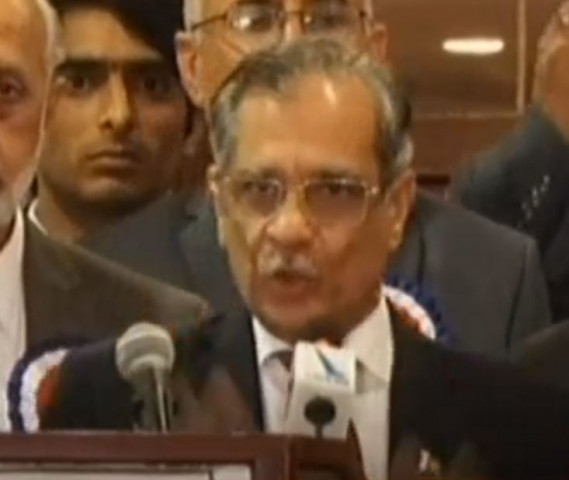CJP exhorts judiciary to establish credibility
Signals readiness to probe into missing persons’ killings

Chief Justice of Pakistan Mian Saqib Nisar. PHOTO: EXPRESS NEWS SCREEN GRAB
The Chief Justice of Pakistan (CJP) Mian Saqib Nisar has said the court will conduct a ‘judicial inquiry’ into extrajudicial killings of the missing persons found in the shape of mutilated bodies if an application is submitted at appropriate forum.
“For the first time in the history of Pakistan, I summoned the DG ISI (inter-Services Intelligence), DG MI (Military Intelligence), IGs (inspector generals) of four provinces, Rangers DGs of four provinces and IB (Intelligence Bureau) head and gave them the task to provide details of the missing persons.
“They are asked why these people went missing and where they have gone. They are asked to give an affidavit if these people are not in their custody so that action could be taken against them if their affidavits are proved incorrect,” Justice Nisar said on Friday.
CJP takes notice of encroachments on Hindu community land
The top judge, addressing a seminar organised by the Supreme Court Bar Association (SCBA), was talking with reference to comment of a female lawyer who had said Balochistan’s missing persons had not been provided justice despite passage of 15 years.
The CJP held the judiciary and lawyers responsible for delay in dispensation of justice and made it clear that neither the coming generation nor the history would forgive them if the judiciary failed in establishing its credibility.
“The bar is an important part of the judicial system. Legendary lawyers did not tell lies in the court rooms and the judges used to respect them. If our structure stands on lies then what can we deliver?”
The CJP said judges are being paid the highest salaries and each judge costs around Rs50,000 to Rs55,000 per day. “But are the judges doing enough work to justify these salaries?” he asked.
He said the judges would have to work with devotion, adding that when there is delay in dispensation of justice, the people lose trust on judges. “Is it not like injustice that we do not hear cases for several days and defer cases continually?”
The top judge urged the lawyers’ community to plead the cases in an appropriate way rather than causing delays. He said a delay in dispensation of justice has become a menace for society.
“Unfortunately we are still following the oral transaction in this century. We would have to upgrade the law, system, and simplify the law but the judiciary could not amend the law,” he added.
He asked it there are provisions in the Qanoon-e-Shahadat which cater for the white-collar crime. “The answer is ‘No’. Who has to make the law? We have to only interpret the law as judges, we are not the lawmakers. We would have to upgrade these laws,” the CJP said.
Drawing attention to the fundamental rights of citizens, the CJP said people are being deprived of these basic rights. He said it is a fundamental right to provide people with drink clean water, good education and health facilities. “Innocent people are dying without medicines and of starvation. Do these things not fall under fundamental rights and basic rights? Can’t we take notice of such things?” he asked.


















COMMENTS
Comments are moderated and generally will be posted if they are on-topic and not abusive.
For more information, please see our Comments FAQ